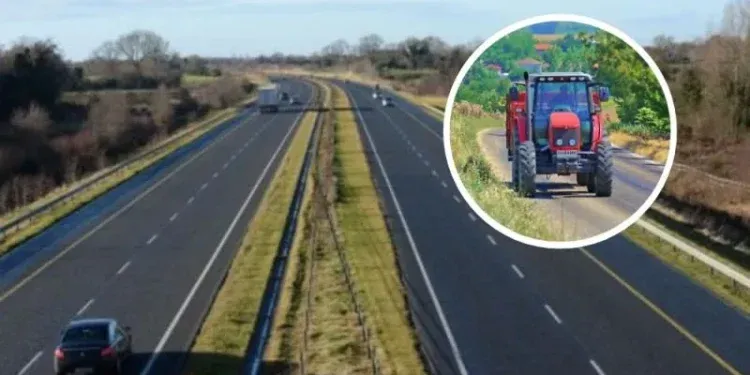The Irish Road Haulage Association (IRHA) has called for an outright ban on tractors and other slow-moving vehicles from Ireland’s motorway network, raising serious concerns over road safety and traffic congestion. The association argues that the presence of agricultural machinery on high-speed routes is creating hazardous conditions for all road users, particularly during the busy summer season.
A Unique Situation in the EU
According to IRHA President Ger Hyland, Ireland is currently the only EU country that permits tractors on motorways. Under existing regulations set by the Road Safety Authority (RSA), tractors are allowed on motorways if they can reach and maintain a minimum speed of 50 km/h. However, the IRHA insists this is insufficient to ensure safety on roads where the speed limit can reach 120 km/h.
“Tractors cause a build-up of traffic behind them on the motorway, with people pulling into other lanes at the last minute to avoid the slow-moving tractor,” said Hyland. “This is a recipe for disaster.”
He described the increasing visibility of tractors towing heavy agricultural loads—such as hay, silage, and slurry tanks—on the country’s busiest motorways during the summer months as a major threat to public safety. “A family in a car driving in heavy fog on the motorway at 120km/h could come across this tractor and have very little time to react,” he warned. “This is a serious tragedy waiting to happen.”
Congestion and Dangerous Manoeuvres
The IRHA also claims that slow-moving farm vehicles are creating delays and forcing dangerous overtaking manoeuvres, particularly for heavy goods vehicles (HGVs) that are unable to quickly adjust their speed or change lanes.
“Many of our members are professional drivers operating HGVs, and they’re frequently getting stuck behind tractors and trailers,” Hyland added. “This not only causes congestion but increases the likelihood of collisions.”
The association is now urging the Government to review the current legislation in collaboration with the RSA and the Irish Farmers’ Association (IFA). The IRHA proposes restricting tractors to local and regional roads, reserving motorways for high-speed, long-distance travel.
Farmers Push Back
In response, the IFA defended the use of motorways by tractors, emphasising that modern agricultural vehicles are generally equipped to travel at speeds above 50km/h and are therefore compliant with RSA regulations.
“In most cases, the journey they are undertaking is local so the time spent on the motorway is short,” the IFA said in a statement. “Many farm holdings are fragmented, so farmers need access to the road network, including motorways, to carry out their work efficiently.”
The IFA signalled its intent to resist any legislative change that would prohibit tractor access to motorways, suggesting such a move would place an undue burden on the farming community.
A Balancing Act Between Safety and Agricultural Needs
This latest debate touches on broader questions about the evolving role of Ireland’s road infrastructure and the competing demands of different road users. While motorways are designed for high-speed, long-distance traffic, much of Ireland’s agricultural activity still depends on flexibility in transport routes—particularly during harvest season or when moving between fragmented land holdings.
The Road Safety Authority has yet to respond publicly to the IRHA’s demands, but the issue is expected to gain traction in political and transport circles in the coming weeks.
As rural and urban needs continue to collide on the country’s roadways, any decision on restricting motorway access is likely to prompt strong reactions from both the haulage and farming sectors.
This latest call from the IRHA comes amid broader national discussions around road safety and traffic management (read more here), particularly following recent efforts by the Government to reduce road fatalities and improve conditions for all users.
Whether or not tractors will ultimately be banned from motorways remains uncertain, but the debate highlights the challenges of balancing modern transport efficiency with Ireland’s deeply rooted agricultural economy.







